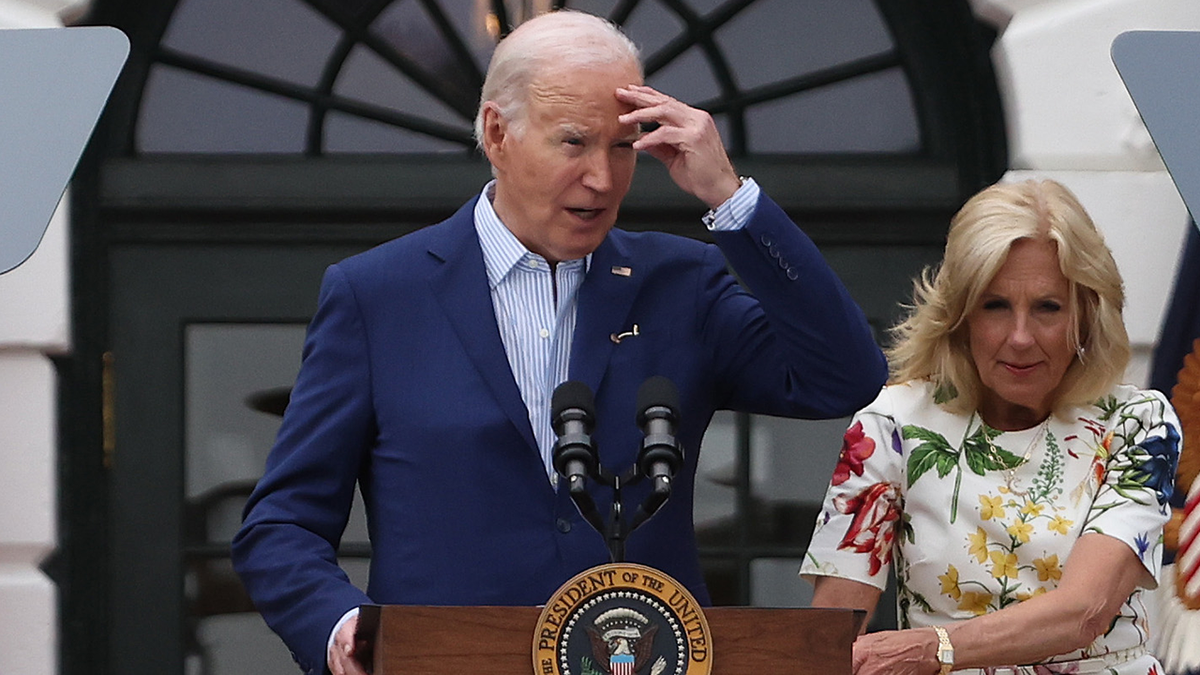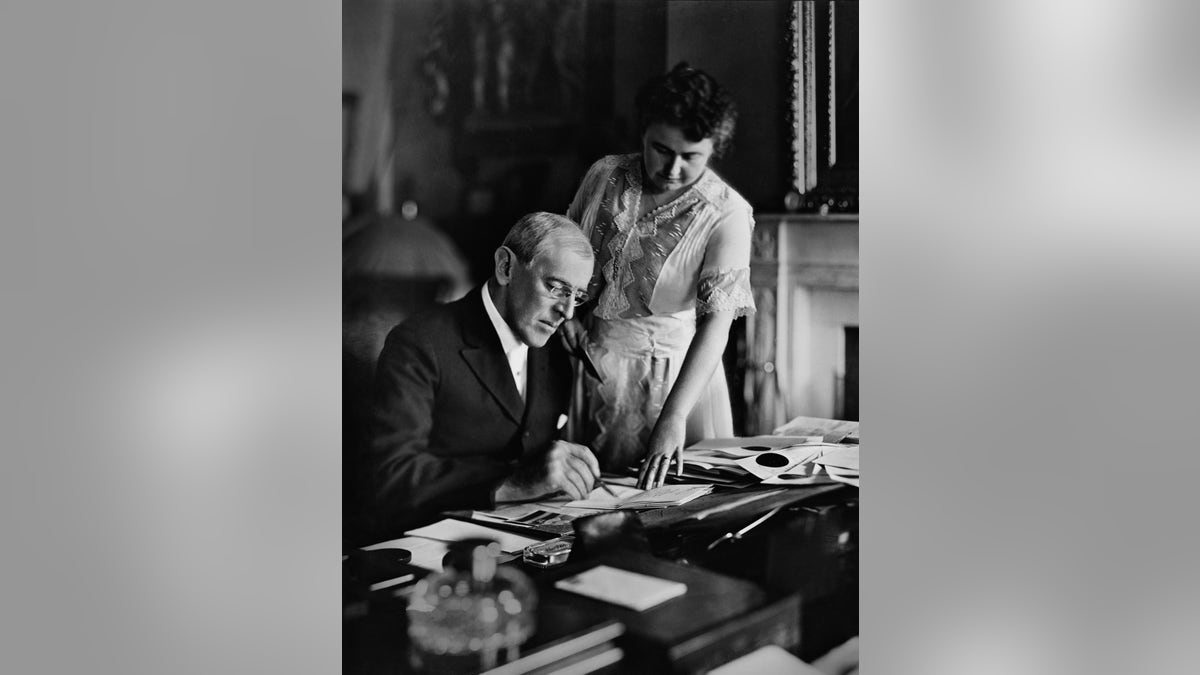Trump reacts to Biden's recent blunders: 'Not at the top of his game'
Former President Trump discusses the threats the world faces over the advancement of nuclear weaponry amid concerns over President Biden's cognitive health on 'Hannity.'
President Joe Biden is in serious mental decline, from the "perpetual state of confusion" displayed on his trip to France, to Washington insiders reporting that the president has performed poorly in meetings, the president’s cognitive impairment raises serious concerns for U.S. national security with a heightened potential for global conflict.
The mental acuity of a nation’s leader plays a critical role in shaping and executing foreign policy – akin in many ways to a general leading an army.
Gen. Kurt von Hammerstein-Equord, a noted German military officer and opponent of Adolf Hitler, is said to have categorized leaders on their intelligence and industriousness, noting:
"I divide my officers into four classes as follows: the clever, the industrious, the lazy, and the stupid. Each officer always possesses two of these qualities. Those who are clever and industrious I appoint to the General Staff. Use can, under certain circumstances, be made of those who are stupid and lazy. The man who is clever and lazy qualifies for the highest leadership posts. He has the requisite and the mental clarity for difficult decisions. But whoever is stupid and industrious must be got rid of, for he is too dangerous."

President Biden's obvious mental decline harms American security across the globe. Here, he and first lady Jill Biden deliver remarks during the congressional picnic on the South Lawn of the White House on June 4, 2024. (Kevin Dietsch/Getty Images)
Applying von Hammerstein-Equord's classification to contemporary politics, some critics argue that Biden, in his current state, fits in the "stupid and lazy" category. This combination, while not ideal, allows for the possibility of stage management by staff, competent or otherwise. Though our system of government expects a vigorous executive — as Alexander Hamilton noted in Federalist 70, "energy in the executive is the leading character in the definition of good government." Today, we have no energy in the White House.
But while the president’s vacuous passivity can be navigated with a degree of difficulty, Vice President Kamala Harris’s vigorous foolishness is a bigger threat. This perspective, along with Harris’s historically low approval ratings, is likely why the Biden cabinet hesitates to invoke the 25th Amendment to remove Biden from office — they’re stuck with no good options.
Instead, look for the Democratic National Committee to swap Biden out at the convention after a pressure campaign from party power brokers for him to step down. This would release Biden’s delegates, allowing for a brokered convention that would likely select California Gov. Gavin Newsom or another high-profile progressive. Then, the sole-remaining challenge would be that Biden could muddle through to the end of his term.
Woodrow Wilson’s decline and its consequences
But even were Newsom to replace Biden on the Democratic ticket, America remains under grave threat from the dangers of a mentally declining president. To see how, revisit the case of Democrat President Woodrow Wilson. Wilson’s presidency was marred by significant health issues that had profound impacts on his leadership and the country’s direction.
Wilson’s health deteriorated significantly during his second term. On Oct. 2, 1919, Wilson suffered a severe stroke, which left him paralyzed on his left side and impaired his vision. His condition was largely concealed from the public, and his wife, Edith Wilson, along with his physician, controlled access to him and the information he received. This period is often referred to as a time when Edith Wilson effectively acted as the de facto president.
Wilson’s compromised health had critical implications for both domestic and international affairs. Domestically, the post-World War I period was marked by significant unrest and violence. The demobilization of troops led to economic turmoil and widespread strikes in major industries.
The summer of 1919 saw a series of race riots, further destabilizing the nation. The Red Scare, fueled by fears of communism following the Bolshevik Revolution in Russia, led to the Palmer Raids, during which thousands of suspected radicals were arrested and more than 500 deported.
Internationally, Wilson’s incapacitation coincided with crucial moments in global politics. The Russian Civil War, which saw intervention by the U.S. and European nations, might have played out differently had Wilson been fully in control of his faculties.

Woodrow Wilson (1856-1924), president from 1913-1921, goes over papers at his desk as his second wife Edith Bolling Galt Wilson looks on, mid 1910s. Edith was often referred to as "secret president" because of the important role she played in Wilson's presidency during his long and debilitating illness following a stroke. (Stock Montage/Getty Images)
Wilson’s stroke happened 17 days before anti-Bolshevik Estonian forces, backed by Britain, reached the key city of Petrograd (Saint Petersburg), only to be rebuffed due, in part, to a lack of Western support. Wilson’s inability to effectively lead during this period may have sealed Russia’s fate in its descent down the bloody path of communism.
The Treaty of Versailles and the establishment of the League of Nations were also significantly impacted by Wilson’s health. Despite his efforts, Wilson’s refusal to compromise on the treaty led to its rejection by the U.S. Senate. This rejection not only undermined Wilson’s vision for global peace but also weakened the League of Nations, potentially altering the course of international relations in the interwar period.
Today’s implications
Drawing parallels between Wilson’s era and the present, the mental decline of a sitting president poses significant risks. With Biden, these concerns are amplified by the current global landscape, characterized by geopolitical tensions and the threat of conflict.
CLICK HERE FOR MORE FOX NEWS OPINION
Today, the threats are multifaceted and increasingly complex:
1. China’s aggression toward Taiwan, the Philippines and Japan
China’s bellicose actions in the South China Sea and its threats toward Taiwan represent significant challenges. The potential for conflict in this region necessitates strong U.S. leadership to support allies and deter China while making the needed case to the American public for an urgent revitalization of America’s military capacity.
2. Russia’s invasion of Ukraine
Russia’s aggressive actions in Ukraine have destabilized the region and threatened European security. The ongoing conflict requires decisive and strategic leadership from the U.S., especially with the growing alliance between the world’s two foremost authoritarian powers, China and Russia.
3. Hamas’ attack on Israel and the Middle East conflict
Hamas’ Oct. 7 orgy of rape, torture and murder against Israel has escalated tensions in the Middle East. There is a heightened risk of a broader conflict involving Iran and its proxies, which could destabilize the entire region.

California Gov. Gavin Newsom would be a possible alternative to Biden if the Democratic convention delegates have to pick. (AP Photo/Terry Chea)
4. North Korea’s threats to South Korea
North Korea’s continued provocations and threats against South Korea pose a direct risk to regional peace and require vigilant and capable leadership to manage the situation effectively.
CLICK HERE TO GET THE FOX NEWS APP
A mentally compromised leader will struggle to make sound decisions, respond effectively to crises, or navigate complex international negotiations. Further, and more dangerously, international opponents will perceive the president’s weakness as an opportunity to strike.
The next eight months will be among the most dangerous in American history. Jan. 20, 2025, can’t come soon enough.













































